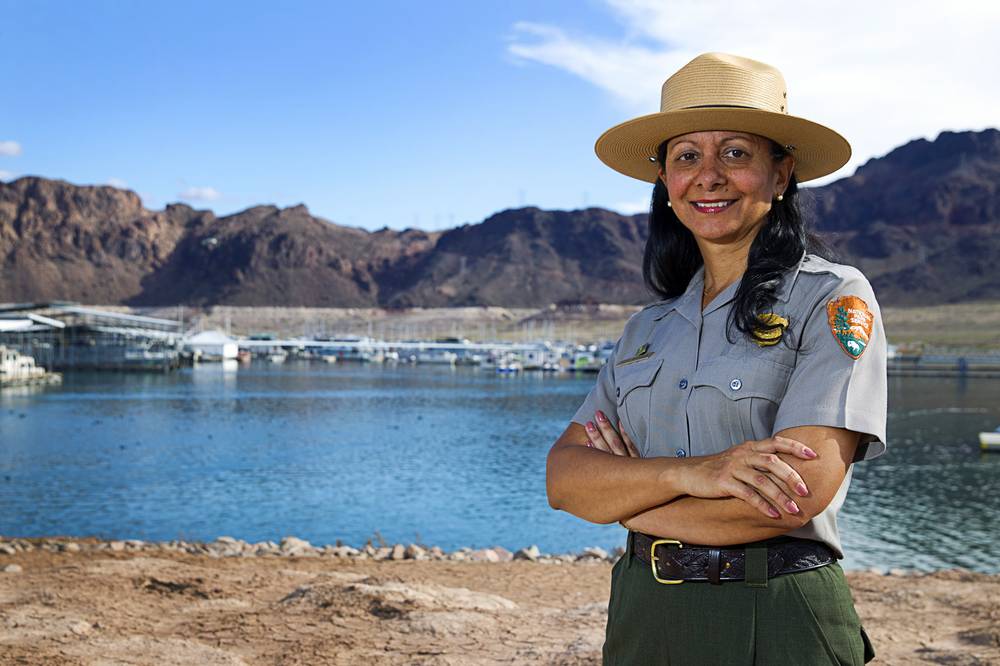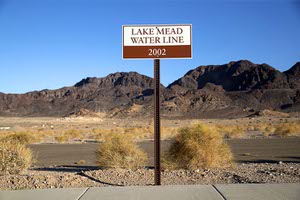How big is Lizette Richardson’s new job? It’s 1.5 million acres big, 2,337 square miles big, $1.3 billion in infrastructure big. As the superintendent of Lake Mead National Recreation Area, she’s responsible for just about everything inside the expansive park, which includes land in two states and draws almost 7 million annual visitors.
“It’s kind of like a mayor of a little city,” she says. “Anything you can think of, from all the personnel aspects to park operations, is really part of the superintendent role.”
This is a return of sorts for Richardson, her second stint at Lake Mead after nine years as chief of maintenance and engineering at the park, and then a job overseeing capital improvement projects across the National Park Service. Now that she’s back, we talked to Lake Mead’s new boss about dealing with climate change, park service life-goals and showing kids the wonder of dark night skies.
You grew up in the Bronx. Did you spend much time at national parks or doing outdoorsy stuff as a kid? Not much. Growing up in New York, I wasn’t really that exposed to national parks. I think it’s really great that as part of the National Park Service centennial and as part of relevancy for the future we’re really focusing on kids and, especially if they’re in an urban area, to get them out and into camping and experiencing the dark night skies and wilderness so they can understand that.
In your 11 years with the NPS have you visited many parks? Do you have a favorite? I’ve visited a lot in our network here, Joshua Tree, Mojave, Zion. They’re all beautiful. And in my previous job, I got to see a couple of different parks, Cape Cod and Glacier. It’s hard to have a favorite. They’re all unique and interesting in their own way. Of course, I’m partial to Lake Mead.
Is there some sort of badge of honor that you get for visiting all 59 national parks? We have little passport stamps, so some people will go to all the parks and they’ll get their passport stamped. And then a lot of people also collect pins. I think you find a lot of folks in the park service, that’s one of their goals, to try to see how many parks they can visit throughout their lifetime.
Your previous job dealt with construction projects across the National Park Service and the effects of climate change. How are parks being affected? They could be dealing with flooding or different temperature variations, hurricanes. Each one of the parks has very unique ways of dealing with it, so it is something that the park service is really taking seriously and trying to figure out what needs to happen as they’re making critical decisions for their parks and infrastructure in the future.
Obviously Lake Mead is also seeing the effects of climate change and the drought. How are you dealing with the dropping water level? I know that we’ve got some challenges, and I know that this summer they’ve reached really low levels of the lake, but we’re still trying to do as much as we can to maintain the access and do construction on the [boat] launch ramps. It is a serious issue. Right now we’re going on 14 years of the drought. Part of my position here will be working really closely with the Bureau of Reclamation on the lake levels and just trying to see what we need to do to keep access to the lake for visitors.
Do visitors understand what’s happening with the lake? Do you hear any misconceptions? Unfortunately, with the drought issues and the lower lake levels you always hear people who are not familiar with Lake Mead say, “Well, they’re running out of water,” or “There’s not enough water there.” The lake is one of the largest reservoirs. We do have challenges with access, but once you get out there there’s plenty of space for everybody.
Why do you think national parks are so important? A lot of the parks celebrate key items in our history. I think it kind of connects families and their heritage, and so you feel like that’s something important that can be passed down. Here at Lake Mead, I always like to go to the Junior Ranger programs and see all the little kids learning. Whether it’s about the different wildlife or the plants or cool things you can do in national parks, they’re just so excited and they’re just so eager to learn.








